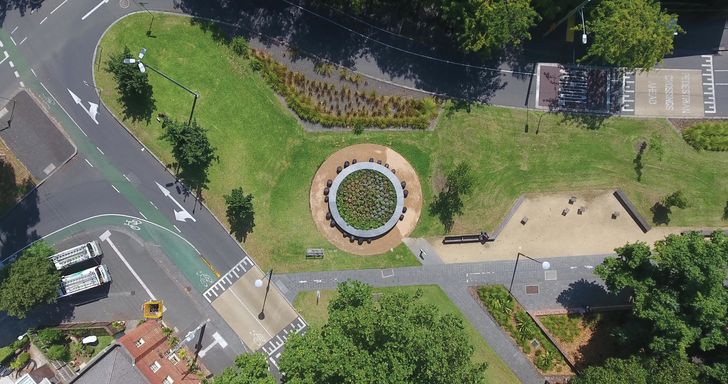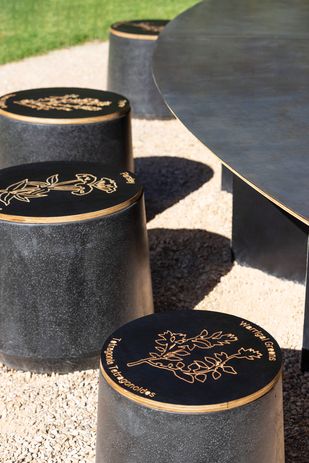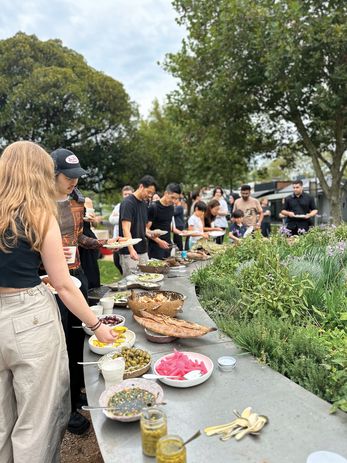[ad_1]
As designers, many of what we think about our greatest concepts won’t ever be constructed. Some succumb to budgets or adjustments in scope, others to design competitors submissions – regardless of the purpose, such concepts are filed away on exhausting drives or dusty drawing racks. Then we transfer on, acutely aware that in our business, it may well really feel like a lot of what we produce is destined for the bin. However what occurs if we reimagine that bin not as trash, however as compost: a spot from which concepts will be tailored, condensed and made match for brand spanking new functions?
Two long-time collaborators – panorama architects Enlocus and designers Frequent – explored this strategy with The Roundtable, a small venture in North Melbourne’s Errol Road Reserve. The unique temporary got here out of the NGV Structure Fee competitors, for which the collaborators put collectively a response that was half furnishings, half pavilion: an unlimited, tilted desk whose centre harboured a patchwork of edible crops. The proposal was shortlisted however finally unsuccessful, but the design staff felt that after all of the work it had channelled into the idea, it was too attention-grabbing to desert.
Positioned reverse North Melbourne Main College, The Roundtable has shortly turn out to be a function of day by day group life.
Picture: Frequent
When purposes opened for the Melbourne Metropolis Revitalisation Fund, the staff submitted The Roundtable. This time, it was profitable – and, very similar to compost, its time within the bin proved transformative. The fund’s directors (the Victorian Authorities and the Metropolis of Melbourne) turned the design staff’s new purchasers, bringing with them adjustments within the venture’s scope and website. Whereas all the time meant to be a short lived set up, The Roundtable wanted to be made much more modest in each price range and footprint to align with the Metropolis of Melbourne’s goals.
The staff and its purchasers settled on a website, after which it was time to refine the scheme to its most necessary parts. “We needed to assume, how can we begin to simplify [the concept] down for price range, taking the rules that we had initially labored with?” says Michael Ford, co-director at Enlocus. “By altering its kind and site we might begin to shift what the ‘desk’ was and what it meant.” Nevertheless it was difficult to search out the essence of the easy idea – we’re used to tables in gardens, certain, however what about tables that are gardens?
Species’ botanical names have been etched into marine ply tops on seats which, when the set up ends, might be given out to the group with the herbs they include.
Picture:
Dianna Snape
Due to the venture’s small dimension and price range, the design staff took a hands-on strategy, contributing to the construct via plant set up and Bunnings runs and even nurturing seedlings in a makeshift nursery at Frequent founding associate Ben Milbourne’s close by dwelling. The result’s easy, but detailed. The chosen species’ botanical names have been fastidiously etched into marine ply seat tops, and the mildsteel tabletop has been constructed and assembled as befits bespoke furnishings. Bronze fennel (Foeniculum vulgare), lemon verbena (Aloysia citrodora) and kangaroo grass (Themeda triandra) create a feathery peak on the desk’s centre, whereas parsley (Petroselinum crispum), warrigal greens (Tetragonia tetragonioides) and society garlic (Tulbaghia violacea) kind a hoop of aromatic tufts on the edge.
Positioned instantly reverse North Melbourne Main College, The Roundtable has shortly turn out to be a function of group life that’s visited day by day at each morning and afternoon drop-offs. The staff seems to have few regrets about not successful the unique NGV fee; the gallery the place the desk would have been introduced is “an incredible area,” Milbourne says, “but it surely’s [very] managed. [Here] the venture is a really totally different sort of expertise. It’s in a public area. Individuals are actively engaged with it [over and over], day after day.”
To suit website and price range constraints, the venture was pared again to its essence, successfully changing into an experimental testing floor.
Picture:
Sylvia Hungaria
As any vegetable gardener is aware of, day by day visits are an necessary step in constructing a relationship with a meals backyard – and for probably the most half, the local people have been respectful of the venture as a shared useful resource, harvesting solely what they want. “Initially, individuals didn’t perceive what [the project] was, and there was some stage of hesitance,” Ford says. “As soon as it began being constructed although, individuals [started to] catch on and see what it was about. [Now] the group have [really] began taking up the venture themselves – bringing [the herbs] into their houses for dinner, doing the weeding and making it a gathering location after faculty.” Whereas it was initially deliberate as a three-month set up, the Metropolis of Melbourne has granted it an extension to remain on the website till not less than July.
Non permanent tasks can typically be seen as wasteful (assume milkcrates, or crops that aren’t given an opportunity to thrive), however The Roundtable was designed with pack-down in thoughts. Seats have been crafted round pots which, when the set up ends, might be given out to the group with the herbs they include; crops might be given away; the gentle metal edging is simple to recycle. Components of the desk’s larger plywood construction could show tough to repurpose, however the designers’ important consideration to circularity is nonetheless a step in the fitting “short-term tasks needn’t be wasteful” path. In actual fact, lowering a venture to its essence can have plenty of energy, and small short-term tasks made with high quality supplies (and with pack-down in thoughts) can perform as experimental testing grounds for tasks and concepts.
Once I visited The Roundtable in late April, it was persevering with to flourish. I minimize a bunch of basil and parsley from the outer ring of herbs as I left, the perfume lingering within the air for the following customer to get pleasure from. That is solely one of many many advantages of composting this venture proposal as an alternative of trashing it, of striving for not solely literal but in addition summary circularity. As Milbourne says, “[It’s] good to see that via refining that concept … it doesn’t really feel wasted.”
Plant checklist
Microseris lanceolata (murnong), Tetragonia tetragonoides (warrigal greens), Rhagodia spinescens (spiny saltbush), Persicaria odorata (Vietnamese mint), Themeda thiandra (kangaroo grass), Dianella caerulea (blue flax-lily), Mentha australis (native river mint), Origanum vulgare (oregano), Petroselinum crispum (parsley), Salvia officinalis (frequent sage), Arthropodium cirratum (New Zealand rock lily), Aloysia triphylla (lemon verbena), Foeniculum vulgare (fennel), Tulbaghia violacea (society garlic), Rosmarinus officinalis Prostrata (rosemary), Helichrysum italicum (curry plant)
[ad_2]
Source link






